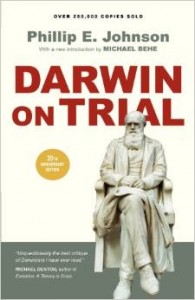Search Results for: papers/490937
William Jennings Bryan on the Degradation o
No circle is reserved for man alone… He is, according to the diagram, shut up in the little circle entitled ‘Mammals,’ with thirty-four hundred and ninety-nine other species of mammals…. What shall we say of the intelligence, not to say religion, of those who are so particular to distinguish between fishes and reptiles and birds, but put a man with an immortal soul in the same circle with the wolf, the hyena, and the skunk? What must be the impression made upon children by such a degradation of man?
0830838317
Darwin on Trial
In his own era, Darwin’s most formidable opponents were fossil experts, not clergymen. Even today, according to the author, the fossil record, far from conclusive, does not support the presumed existence of intermediate links between species. A law teacher at UC-Berkeley,
Johnson deems unpersuasive the alleged proofs for Darwin’s assertion that natural selection can produce new species. He also argues that recent molecular studies of DNA fail to confirm the existence of common ancestors for different species. Doubting the smooth line of transitional steps between apes and humans sketched by neo-Darwinists, he cites evidence for “rapid branching,” i.e., mysterious leaps which presumably produced the human mind and spirit from animal materials. This evidence, to Johnson, suggests that “the putative hominid species” may not have contained our ancestors after all. This cogent, succinct inquiry cuts like a knife through neo-Darwinist assumptions. ~ Publishers Weekly
Phillip E. Johnson on Materialism and Reason
[T]he logic of materialist reductionism implies that science itself is the product of unreasoning material causes. No wonder the Age of Reason ends with the age of postmodernist relativism! And yet we still see the reductionists complacently describing religious belief either as a meme or as the product of a “God module” in the brain without realizing that they are sawing off the limb on which they themselves are sitting. If unthinking matter causes the thoughts the materialists don’t like, then what causes the thoughts they do like?
S. Lovtrup on Darwinism
Micromutations do occur, but the theory that these alone can account for evolutionary change is either falsified, or else it is an unfalsifiable, hence metaphysical theory. I suppose that nobody will deny that it is a great misfortune if an entire branch of science becomes addicted to a false theory. But this is what has happened in biology: … I believe that one day the Darwinian myth will be ranked the greatest deceit in the history of science. When this happens many people will pose the question: How did this ever happen?
C.S. Lewis on the Least Jealous Love
In each of my friends there is something that only some other friend can fully bring out. By myself I am not large enough to call the whole man into activity; I want other lights than my own to show all his facets. Now that Charles [Williams] is dead, I shall never again see Ronald’s [Tolkien] reaction to a specifically Caroline joke. Far from having more of Ronald, having him “to myself” now that Charles is away, I have less of Ronald. Hence true friendship is the least jealous of loves. Two friends delight to be joined by a third, and three by a fourth, if only the newcomer is qualified to become a real friend. They can then say, as the blessed souls say in Dante, “Here comes one who will augment our loves.” For in this love “to divide is not to take away”. Of course the scarcity of kindred souls — not to mention the practical consideration about the size of rooms and the audibility of voices — sets limits to the enlargement of the circle; but within those limits we possess each friend not less but more as the number of those with whom we share him increases. In this, Friendship exhibits a glorious “nearness by resemblance” to Heaven itself where the very multitude of the blessed (which no man can number) increases the fruition which each has of God. For every soul, seeing Him in her own way, doubtless communicates that unique vision to all the rest. That, says an old author, is why the Seraphim in Isaiah’s vision are crying “Holy, Holy, Holy” to one another (Isaiah 6:3). The more we thus share the Heavenly Bread between us, the more we shall all have.
Clyde Kluckhohn on Universal Moral Truths
Edmund Burke on Behalf of a Noblemen’s Reformation Over a People’s Revolution
Through the same plan of a conformity to nature in our artificial institutions, and by calling in the aid of her unerring and powerful instincts, to fortify the fallible and feeble contrivances of our reason, we have derived several other, and those no small benefits, from considering our liberties in the light of an inheritance. Always acting as if in the presence of canonized forefathers, the spirit of freedom, leading in itself to misrule and excess, is tempered with an awful gravity. This idea of a liberal descent inspires us with a sense of habitual native dignity, which prevents that upstart insolence almost inevitably adhering to and disgracing those who are the first acquirers of any distinction. By this means our liberty becomes a noble freedom. It carries an imposing and majestic aspect. It has a pedigree and illustrating ancestors. It has its bearings and its ensigns armorial. It has its gallery of portraits; its monumental inscriptions; its records, evidences,
and titles. We procure reverence to our civil institutions on the
principle upon which nature teaches us to revere individual men; on
account of their age; and on account of those from whom they are
descended. All your sophisters cannot produce any thing better adapted
to preserve a rational and manly freedom than the course that we have
pursued, who have chosen our nature rather than our speculations, our
breasts rather than our inventions, for the great conservatories and
magazines of our rights and privileges.
